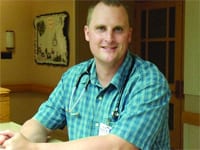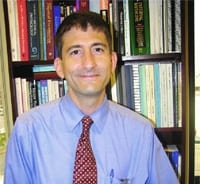Birth of a Notion Midwifery Center Director Is Focused on Care Delivery
Dr. Tucker Kueny says that, for as long as he can remember, he’s wanted to practice medicine.
And he believes he owes much of this desire, or passion, as well as his approach to his work, to the relationship he developed with his pediatrician when he was young.
“He was a great role model; I had a lot of very positive experiences with him,” said Kueny. “He was very accessible, personable, friendly, and never scary, no matter what needed to happen. He was a man who was ahead of his time in many respects, especially with how he approached care, especially with children.
“He would deal with each patient as a person and understand something about them that let him know more than just the presenting disease or complaint,” he continued, adding that this is the general approach he takes to his work as an ob/gyn and as medical director of the Midwifery Program at Cooley Dickinson Hospital, which opened its doors in June 2008.
It was the opportunity to essentially blueprint and then manage such a program that led Kueny to leave a position as medical director of Pioneer Women’s Health, a collaborative ob/gyn practice owned by Baystate Health that focuses on midwifery care for Franklin County. Two years after accepting his new assignment, Kueny is enthusiastic about its prospects for continued growth and the corresponding surge in the popularity of the midwifery model. Meanwhile, he considers this a great career opportunity.
Indeed, he said the CDH facility is fairly unique in that it is an independent midwifery practice.
The program includes four midwives who, as Kueny explained, do most of the “frontline work” during a pregnancy and delivery. He will handle any complications that arise, and acts primarily as a consultant to the midwives.
He said there are several advantages to this model of care that are attractive to both patients and the care providers.
“The approach to pregnancy care with midwifery is that every patient is considered normal, and that pregnancy and birth are considered normal parts of a woman’s lifespan,” he explained. “And so we try to not medicalize pregnancy and birth.
“I would like to think — and there is some evidence to support this — that midwifes can provide care more efficiently, and with the same outcomes,” he continued. “I think there are advantages, both in terms of patient outcomes and the overall cost of care.”
For this, the latest installment of its Today’s Physician series, The Healthcare News talks with Kueny about his work, the midwifery model, and where he wants to take CDH’s unique program.
Baby Steps
Kueny grew up in California, and loved both the lifestyle and higher education system there. But now, 14 years after leaving the Sunshine State, he’s an avid fan of Western Mass. and all it has to offer.
The move to the East Coast came about largely due to Kueny’s residency in obstetrics and gynecology at Baystate Medical Center between 1996 and 2000. That experience followed undergraduate work at Stanford — where he earned a BA in Eastern European and Soviet History and a BS in Biology — and then his work toward a medical degree at the University of California, San Diego School of Medicine in La Jolla.
“The UC schools are amazing medical schools, and, fortunately, very affordable,” he said. “That combination of quality and affordability make them quite attractive, and you can’t beat going to school in San Diego for four years.”
Perhaps, but after his residency, Kueny took a job with Baystate and Pioneer Women’s Health. He and his wife settled in Northampton and became enamored with that culturally rich community and Western Mass. in general.
“We both really fell in love with the area,” he said. “I had two daughters born while I was in residency, and this just seemed like the perfect area to raise a family.”
Overall, it was an attractive picture that got even better when CDH recruited Kueny to get its midwifery program off the ground.
“I got an amazing offer from Cooley Dickinson when they were starting this midwifery program, and were looking to really establish a new type of practice that hadn’t existed there,” he said. “My name came up in some focus groups, that started some conservations, and things progressed from there. I just saw it as an incredible opportunity for me at that point in my career.”
Kueny said his assignment was to build the program from the ground up — literally and figuratively. He oversaw the conversion of a 100-year-old Victorian — essentially taken down to the studs — into the center’s home. At the same time, he went about recruiting midwives and crafting a working philosophy.
He told The Healthcare News that the program fills a mostly unmet need and Northampton and surrounding communities, and provides women with another important option when it comes to care during pregnancy and delivery.
“Some women want to go to an ob/gyn, and I think that’s great, being an ob/gyn myself,” he noted. “But I think this is a very important option for women to have; they can now choose whatever model of care they are comfortable with.”
The CDH facility is staffed by four midwives, he said, and a patient will likely receive care from all of them over the course of her pregnancy and delivery. In the hospital, a patient’s care is managed by the midwife on call that day. Kueny is essentially on call to handle anything that the midwife would deem abnormal, such as a C-section.
“The midwife will admit the person to the hospital, take care of them throughout their labor, delivery, and post-partum care,” he explained, “with my availability immediately if there were to be any complications, such as an abnormal heart rate, C-section, or anything else.”
At present, about 20{06cf2b9696b159f874511d23dbc893eb1ac83014175ed30550cfff22781411e5} of the deliveries at CDH are handled by midwives, he continued, adding that the number doubled from the first year to the second, and he expects similar increases as awareness of this option grows and some of the misperceptions are erased through education, which is one of many lines on Kueny’s job description.
“There are some assumptions in the community that just aren’t accurate,” he said. “One is that if you use a midwife, you’re not allowed to use pain medication during delivery, that every labor has to non-medicated, and that’s not the case. Another is that, if you have any sort of complication during pregnancy, it’s not appropriate to be taken care of by a midwife, and that’s not the case, either.”
CDH and its midwifery program may also be helped by the recent decision by Baystate Health to stop delivering babies at Mary Lane Hospital in Ware. Those services will shift to Baystate Medical Center, but some from Mary Lane’s service area, especially those in the Belchertown area, may seek out CDH as an option, said Kueny.
In addition to his work with the midwifery program, Kueny also wears other hats, including his ob/gyn practice, where, among other things, he’s helping to bring new gynecological procedures into the forefront. Among them is the use of the da Vinci Surgical System, and specifically its uses in gynecologic surgeries, particularly hysterectomies. (See story in the January 2009 issue of The Healthcare News).
“There are a lot of areas in which we can grow in the community,” he said, “and offer things that people haven’t had in the past.”
Kid Stuff
When he isn’t working to stay on the cutting edge of technology or helping to deliver babies, Kueny is usually spending time with his own children, now 11.
The family enjoys skiing and snowboarding together, and, in general, staying active at all times of the year.
Thus, Kueny’s able to create the kind of attractive work/life balance that comes about when you love what you do and have the commitment to grow personally and professionally. That’s another lesson he took from his role model all those years ago.



Comments are closed.